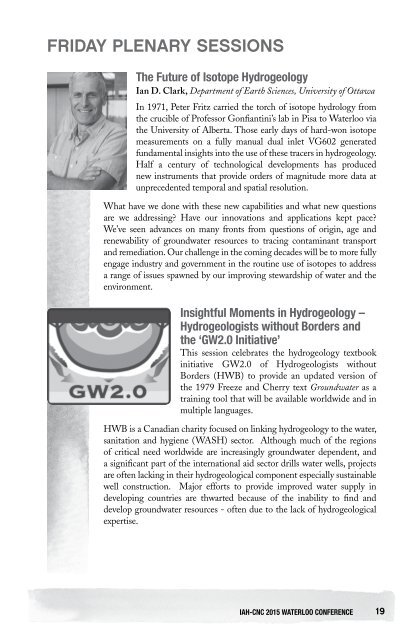Abstracts
IAH_CNC_WEB2
IAH_CNC_WEB2
You also want an ePaper? Increase the reach of your titles
YUMPU automatically turns print PDFs into web optimized ePapers that Google loves.
FRIDAY PLENARY SESSIONS<br />
The Future of Isotope Hydrogeology<br />
Ian D. Clark, Department of Earth Sciences, University of Ottawa<br />
In 1971, Peter Fritz carried the torch of isotope hydrology from<br />
the crucible of Professor Gonfiantini’s lab in Pisa to Waterloo via<br />
the University of Alberta. Those early days of hard-won isotope<br />
measurements on a fully manual dual inlet VG602 generated<br />
fundamental insights into the use of these tracers in hydrogeology.<br />
Half a century of technological developments has produced<br />
new instruments that provide orders of magnitude more data at<br />
unprecedented temporal and spatial resolution.<br />
What have we done with these new capabilities and what new questions<br />
are we addressing? Have our innovations and applications kept pace?<br />
We’ve seen advances on many fronts from questions of origin, age and<br />
renewability of groundwater resources to tracing contaminant transport<br />
and remediation. Our challenge in the coming decades will be to more fully<br />
engage industry and government in the routine use of isotopes to address<br />
a range of issues spawned by our improving stewardship of water and the<br />
environment.<br />
Insightful Moments in Hydrogeology –<br />
Hydrogeologists without Borders and<br />
the ‘GW2.0 Initiative’<br />
This session celebrates the hydrogeology textbook<br />
initiative GW2.0 of Hydrogeologists without<br />
Borders (HWB) to provide an updated version of<br />
the 1979 Freeze and Cherry text Groundwater as a<br />
training tool that will be available worldwide and in<br />
multiple languages.<br />
HWB is a Canadian charity focused on linking hydrogeology to the water,<br />
sanitation and hygiene (WASH) sector. Although much of the regions<br />
of critical need worldwide are increasingly groundwater dependent, and<br />
a significant part of the international aid sector drills water wells, projects<br />
are often lacking in their hydrogeological component especially sustainable<br />
well construction. Major efforts to provide improved water supply in<br />
developing countries are thwarted because of the inability to find and<br />
develop groundwater resources - often due to the lack of hydrogeological<br />
expertise.<br />
IAH-CNC 2015 WATERLOO CONFERENCE<br />
19


